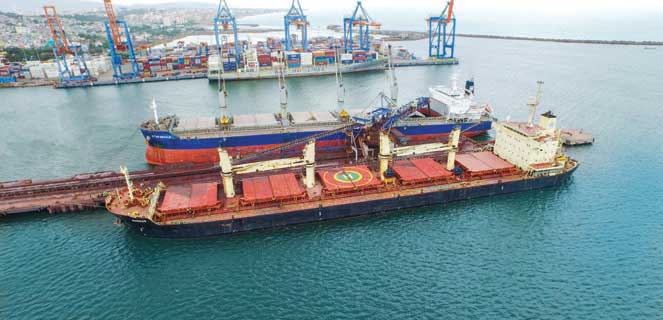
The Major Port Authorities Act, 2020, is aimed at decentralising decision-making and infusing professionalism in the governance of 13 major ports. The act seeks to impart faster and transparent decision-making to benefit stakeholders and improve project execution capabilities by reorienting the governance model in central ports to the landlord port model in line with the best global practices.
Making In an important development in the country’s ports & shipping sector, the Major Ports Authorities Bill, 2020, received the presidential assent to become law in February. Earlier, the Parliament passed the bill, after it was moved by Mansukh Mandaviya, Minister of State (Independent Charge) for Ports, Shipping & Waterways in Rajya Sabha.
After the passage of the bill, an elated Mandaviya tweeted from his official handle, @mansukhmandaviya, “Now the Port-led Prosperity will gain momentum!”
The act is aimed at decentralising decision-making and infusing professionalism in the governance of 13 major ports. These include the ports located in Chennai (Tamil Nadu), Kochi (Kerala), Ennore (Tamil Nadu), Kolkata (West Bengal), Kandla (Gujarat), Mangaluru (Karnataka), Mormugao (Goa), Mumbai Port Trust (Maharashtra), Jawaharlal Nehru Port Trust (JNPT, Maharashtra), Paradip (Odisha), Tuticorin (Tamil Nadu) and Visakhapatnam (Andhra Pradesh).
The act seeks to impart faster and transparent decision-making to benefit stakeholders and improve project execution capability by reorienting the governance model in central ports to the landlord port model in line with the best global practices. This will also help in bringing transparency to operations at major ports. It is also expected to empower the major ports to perform with greater efficiency on account of full autonomy in decision-making and by modernising the institutional framework.
According to Ankit Patel, Vice President & Co-Head, Corporate Ratings at the credit rating agency, ICRA, the bill’s enactment was a long-awaited reform.
“The bill envisions the creation of a board for each of the major ports replacing the existing Port Trusts. The board will have the power to take decisions on tariff setting, land usage, dispute resolution, Capex planning, fundraising and several other strategic issues at the major ports,” Patel told INFRASTRUCTURE TODAY.
He felt that this was also positive in terms of attracting more private sector investments in major ports under the PPP regime, as the budget outlay for the sector is limited while Capex requirements are large under the Ministry of Ports, Shipping and Waterways’ Sagarmala Project.
The Sagarmala project envisages boosting the performance of the country’s logistics sector by unlocking the potential of waterways and the coastline to minimise infrastructural investments required to meet these targets.
A COMPACT LEGISLATION
The act is more compact in comparison to the Major Port Trusts Act, 1963, as the number of sections has been reduced to 76 from 134 by eliminating overlapping and obsolete sections. The new act has proposed a simplified composition of the board of port authority, which will comprise 11 to 13 members from the present 17 to 19 members, representing various interests. A compact board with professional and independent members will strengthen decision-making and strategic planning.
Provision has been made for the inclusion of representatives of the state government in which the asset is located, Ministry of Railways, Ministry of Defence and departments of customs and revenue as members in the board. Besides, the board will also have a Central Government nominee and a member representing the employees of the major port authority.
The role of the Tariff Authority for Major Ports (TAMP) has been redefined. The port authority has now been given powers to fix tariffs, which will act as a reference tariff for purposes of bidding for public-private partnership (PPP) projects. PPP operators will be free to fix tariffs based on market conditions. The board of port authority has been delegated the power to fix the scale of rates for other port services and assets including land.
An adjudicatory board has been proposed to be created to carry out the residual function of the erstwhile TAMP for major ports, to look into disputes between ports and public-private partnership (PPP) concessionaires, to review stressed projects and suggest measures for their revival and to look into complaints regarding services rendered by the ports or private operators operating within the ports.
The boards of port authority have been delegated full powers to enter into contracts, planning and development, fixing of tariff (except in national interest), security and emergencies arising out of inaction and default. In the present MPT Act, 1963, prior approval of the Central Government was required in 22 instances.
The board of each major port shall be entitled to create a specific master plan in respect of any development or infrastructure.
“The new autonomous structure should enable faster decision-making, infusion of professionalism and improvement in efficiency levels ensuring better usage of port assets, hence benefitting all the stakeholders,” averred ICRA’s Patel.
Provisions of corporate social responsibility (CSR) and development of infrastructure by port authority have been introduced. Provision has been made for safeguarding the pay and allowances and service conditions including pensionary benefits of the employees of major ports.
MANISH PANT



Leave a Reply
You must be logged in to post a comment.